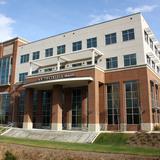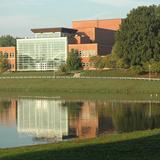School Highlights
Blue Ridge Community College serves 3,991 students (27% of students are full-time).
The college's student-teacher ratio of 15:1 is higher than the state community college average of 13:1.
Minority enrollment is 28% of the student body (majority Hispanic), which is less than the state average of 48%.
Quick Facts (2026)
- Enrollment: 3,991 students
- In-state tuition: $2,304
- Out-state tuition: $8,448
- Student-teacher ratio: 15:1
- Minority enrollment: 28%
- Source: Integrated Postsecondary Education Data System (IPEDS)
Top Rankings
Blue Ridge Community College ranks among the top 20% of public schools in North Carolina for:
Category
Attribute
Completion Rates
School Overview
The teacher population of 273 teachers has stayed relatively flat over five years.
Blue Ridge Community College
(NC) Community College Avg.
Carnegie Classification
Associate's Colleges: High Transfer-High Nontraditional
Associate's Colleges: Mixed Transfer/Career & Technical-High Nontraditional
Institution Level
At least 2 but less than 4 years
At least 2 but less than 4 years
Institution Control
Public
Public
Total Faculty
273 staff
256 staff
Student Body
The student population of Blue Ridge Community College has grown by 66% over five years.
The student-teacher ratio of 15:1 has decreased from 16:1 over five years.
The Blue Ridge Community College diversity score of 0.46 is less than the state average of 0.66. The school's diversity has grown by 20% over five years.
Total Enrollment
3,991 students
2,579 students
Student-Teacher Ratio
15:1
13:1
# Full-Time Students
1,077 students
766 students
# Part-Time Students
2,914 students
1,813 students
# Enrollment Undergraduate
399 students
316 students
# Full-Time Undergraduate Students
1,077 students
766 students
# Full-Time Graduate Students
n/a
22 students
# Part-Time Undergraduate Students
2,914 students
1,990 students
# Part-Time Graduate Students
n/a
3 students
Total Dormitory Capacity
n/a
717 students
% American Indian/Alaskan
n/a
1%
% Asian
2%
3%
% Hispanic
13%
13%
% Black
5%
21%
% White
72%
52%
% Hawaiian
2%
1%
% Two or more races
n/a
3%
% Non Resident races
1%
1%
% Unknown races
5%
5%
Diversity Score
0.46
0.66
College Completion Rate (Students who graduate in less than 4 years)
50%
37%
College Completion Rate (Students who graduate in 4 years or more than 4 years)
n/a
43%
Average Graduate Earnings (10 Years)
$26,700
$27,500
Tuition and Acceptance Rate
The public in-state tuition of $2,304 is less than the state average of $3,915. The in-state tuition has declined by 13% over four years.
The public out-state tuition of $8,448 is less than the state average of $9,508. The out-state tuition has stayed relatively flat over four years.
In-State Tuition Fees
$2,304
$3,915
Out-State Tuition Fees
$8,448
$9,508
% Students Receiving Some Financial Aid
82%
82%
Median Debt for Graduates
$11,000
$11,865
Median Debt for Dropouts
$6,125
$5,846
Acceptance Rate
n/a
82%
SAT Reading
n/a
488
SAT Math
n/a
498
ACT Composite
n/a
20
ACT English
n/a
13
ACT Math
n/a
16
Source: 2024 (or latest year available) Integrated Postsecondary Education Data System (IPEDS) , School Administrators
School Notes
- Blue Ridge Community College is one of 58 institutions that operate under the North Carolina State Board of Community Colleges. The creation of BRCC dates back to 1963, when the North Carolina General Assembly authorized a system of comprehensive community colleges and technical institutes in areas of the state that had a need for institutions of higher learning. A few years later, the residents of Henderson County approved a bond issue and a special tax levy to provide funds for the construction, operation, and maintenance of a school facility to serve the community. Henderson County Technical Institute opened its doors in December 1969 and the first course was offered on January 8, 1970. The first full-time curriculum classes began the following semester on September 14, 1970. Shortly after, in October of 1970, the Board of Trustees changed the name from Henderson County Technical Institute to Blue Ridge Technical Institute. Then nine years later they renamed the school Blue Ridge Technical College. The Board of Trustees approved the current name, Blue Ridge Community College 1987.Blue Ridge Community College Henderson County Campus is located on 128 acres on College Drive, between Airport Road and South Allen Road in Flat Rock, North Carolina. The 13-building complex provides over 358,000 square feet of floor space. In addition to offices, classrooms, laboratory space and student center areas, facilities also include a distance learning center, a 66,000-square foot Applied Technology Building, a comprehensive library, an Environmental and Safety Training Center, teaching and performance auditoriums, and a state-of-the-art Technology and Education Development Center that includes virtual training, television and audio recording studios, and a 1,000- seat conference hall. The Transylvania County Campus is located on nine acres on the corner of Oak Park Drive and Osborne Road in Brevard, North Carolina. The two-building complex houses instructional and office space, an Applied Technology Building completed in 2008, and the Blue Ridge Innovation Network, a 3,500 square-foot facility for small business incubation.Situated near the Blue Ridge Mountains of North Carolina at an altitude of 2,140 feet, the College is easily accessible via Interstate 26, Highways 64, 25, 191, and 176. Commercial air service is provided by several major airlines which serve the Asheville Regional Airport located twelve miles north of Hendersonville. The location between the metropolitan areas of Asheville, North Carolina, and Greenville, South Carolina, place the College near the center of a rapid growth area in southwestern North Carolina. This location is also near several vacation/recreation destinations which include Flat Rock, the Pisgah National Forest, Brevard, Bat Cave, Chimney Rock, Biltmore House, and the Blue Ridge Parkway.Blue Ridge Community College is accredited by Southern Association of Colleges and Schools Commission on Colleges to award the Associate in Arts Degree (A.A.), the Associate in Science Degree (A.S.), the Associate in Fine Arts Degree (A.F.A.), the Associate in General Education (A.G.E.), and the Associate in Applied Science Degree (A.A.Sc.). Contact the Commission on Colleges at 1866 Southern Lane, Decatur, Georgia 30033-4097 or call (404) 679-4500 for questions about the accreditation of Blue Ridge Community College.
Frequently Asked Questions
How much does Blue Ridge Community College cost?
Blue Ridge Community College's tuition is approximately $2,304 for In-State students and $8,448 for Out-State students.
What schools are Blue Ridge Community College often compared to?
Blue Ridge Community Collegeis often viewed alongside schools like Asheville-Buncombe Technical Community College by visitors of our site.
What is Blue Ridge Community College's ranking?
Blue Ridge Community College ranks among the top 20% of community college in North Carolina for: Highest completion rates.
School Calendar
View the Blue Ridge Community College yearly calendar below. Note key dates such as:
Event
Date
Last Day of 1st 8 Week Term
March 04, 2026 (Wednesday)
Last Day To Register For Short Courses
March 06, 2026 (Friday)
Spring Break - No Curriculum Classes
March 16, 2026 (Monday)
Last Day of Spring Semester
May 05, 2026 (Tuesday)
Last Day for Summer 2026 Registration
May 07, 2026 (Thursday)
Recent Articles

Community College Policies and Financial Aid Guide 2026
A 2026 guide to community college policies and financial aid, including FAFSA updates, state aid, tuition rules, and smart planning tips.

Get Better Grades in Community College by Being Social (2026 Update)
Learn how being social in community college boosts grades, retention, and career success. Updated 2026 strategies for academic achievement.

Navigating Community College as an Adult Learner in 2026
A practical 2026 guide for adults returning to community college, covering admissions, financial aid, career planning, and flexible learning options.







